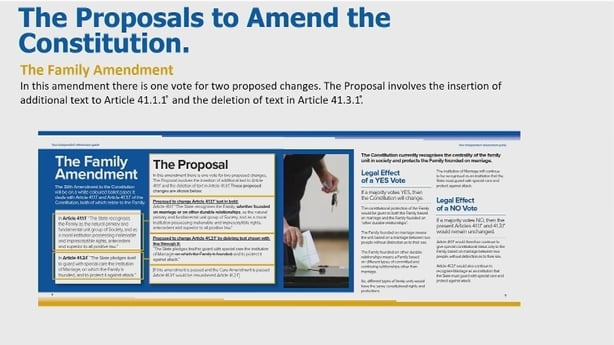The Electoral Commission has said it has "some of the tools but not all of the tools" to deal with misinformation in the campaigns for forthcoming referendums.
Launching its independent information campaign for the referendums on care and the family, Commission Chief Executive Art O'Leary said it is engaging with social media companies.
However, he said it is "highly unlikely" that powers to regulate the dissemination of false claims will be in place before the electorate has a chance to vote on 8 March.
The Electoral Reform Act establishing the Commission was passed by the Oireachtas last year.
But sections giving it powers to regulate political advertising and combat disinformation have not yet been commenced, following concerns raised by the European Commission and objections from social media companies.
The Chair of the Electoral Commission said the upcoming referendums are "complex".
Ms Justice Marie Baker was also speaking at the launch, where a booklet to be sent to 2.3 million households outlining what precisely is being asked was shown.
Campaigns for the referendums on family and care are officially under way, after Minister for Housing Darragh O'Brien signed the order appointing 8 March as polling day.
It comes more than two years after being recommended by the Citizens' Assembly and following many delays.
There will be two separate questions put to the people, on family and care.

Voters will be asked whether or not they want to delete Article 41.2 of the Constitution which references woman's life within the home and mothers' duties within the home, to replace it with gender neutral language which would say the state recognises care by members of a family to one another, by reason of the bonds that exist between them.
The other question is whether to change Article 41.1 which recognises the family as the natural primary and fundamental unit group in society.
The proposed amendment would state the family is founded on marriage, or other durable relationships.
Despite misgivings about the wording, the Social Democrats, People Before Profit, and the Labour Party are supporting a Yes vote on both questions.
Sinn Féin's Eoin O'Broin said it is his understanding that the party will be backing Yes, although it has not yet formally taken a position.
We need your consent to load this rte-player contentWe use rte-player to manage extra content that can set cookies on your device and collect data about your activity. Please review their details and accept them to load the content.Manage Preferences
Women's groups for, against changes outline positions
The National Women's Council is advocating a Yes vote in both referendums, saying that "sexist, stereotypical language has no place in our Constitution and is representative of a time when women were treated like second-class citizens.
"The current definition of family, which only recognises those which exist within the bonds of marriage, is shaming and stigmatising to the countless families who exist outside of marriage, yet are not recognised or protected by our Constitution," the organisation added.
NWC Director Orla O'Connor said: "We have the wording that we have, and this is the first time care will be recognised in the Constitution and that's really important."
"We've got six weeks in order to have this debate and have this discussion and we see it as a step in the right direction.
"It may not have gone far enough for some people but it is ... about recognising care and really importantly, it's about removing a piece from the Constitution that is very sexist and limits women's role.
"What we know from talking to women, a woman's place is anywhere where she wants it to be and anything less is not acceptable in our Constitution," Ms O'Connor added.
Read more:
Explained: What will people vote on in twin referendums?
A group of women - called 'The Silenced Protest' - held a demonstration outside the referendum campaign launch.
One of its members, Estelle Birdy, who described herself as a feminist, said the Constitution does contain archaic language, but has not held any woman back.
Advocating for a No vote, Ms Birdy said the referendum proposes "a full excision of the words mothers and woman from Article 41.2 and a removal of that guarantee to mothers, who bear the pregnancy penalty ... and must have the right to choose".
"It is better for society, it is better for children, and it is better for the women as well to have that right to work outside the home or inside the home," she added.
Additional reporting Juliette Gash





